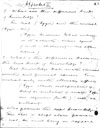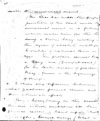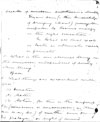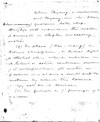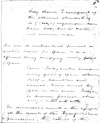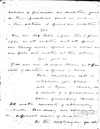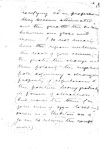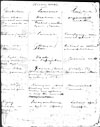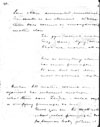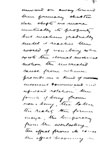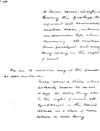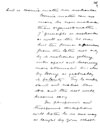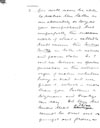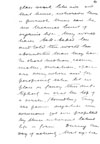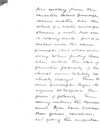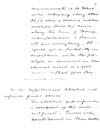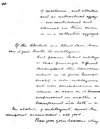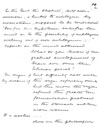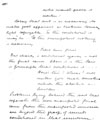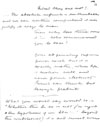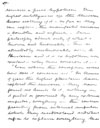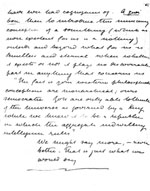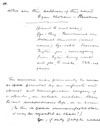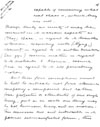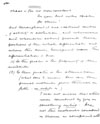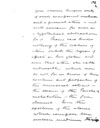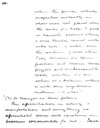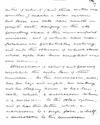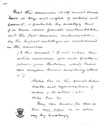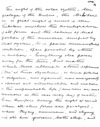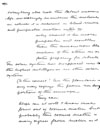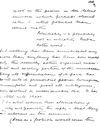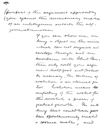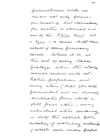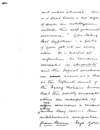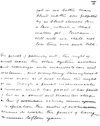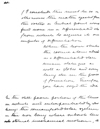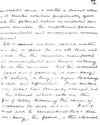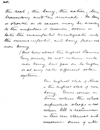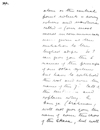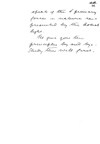Cosmological Notes: Difference between revisions
Pablo Sender (talk | contribs) |
(Spelling correction " proposesed" to "proposed".) |
||
| (35 intermediate revisions by 5 users not shown) | |||
| Line 6: | Line 6: | ||
| header2 = Dates | | header2 = Dates | ||
| writtendate = unknown | | writtendate = unknown | ||
| receiveddate = | | receiveddate = Probably October 1881 | ||
| otherdate = none | | otherdate = none | ||
| header3 = Places | | header3 = Places | ||
| Line 17: | Line 17: | ||
== History == | == History == | ||
The Cosmological notes were | The Cosmological notes were given by [[Morya|Master M.]] in answer to questions put by [[A. O. Hume]] and [[A. P. Sinnett]]. It seems the notes were produced by means of a number of literary exchanges with the Master and conversations held with [[Helena Petrovna Blavatsky|H. P. Blavatsky]], who was a guest of the Humes at the time. As Sinnett recalls: | ||
The Cosmological material | <blockquote>We appointed times each day for these efforts and I still have the M.S. book in which I recorded the results, of a very unsatisfactory character. Some extracts from the volume will show the way we struggled with our difficulties. My notes as they stand are put in the form of question and answer, the questions being rather the outcome of previous conversation than deliberately formulated by ourselves.<ref>See [https://cdn.website-editor.net/e4d6563c50794969b714ab70457d9761/files/uploaded/EarlyDaysOfTheosophyInEurope%2CThe_APSinnett.pdf# ''The Early Days of Theosophy in Europe.''], pp. 14-15, by A. P. Sinnett</ref></blockquote> | ||
The Cosmological material started in late Sept. 1881 (probably after [[Koot Hoomi|Master K.H.]] went into his retreat) and took place from two or three weeks, ending around October 18, when Sinnett left to return to Allahabad. | |||
In the chronology of [[Mahatma Letters]], one could tentatively place these notes before letter [[ML29|No. 29]]. However, since letter [[ML44|No. 44]] is a second set of cosmological teachings, these Notes could be read right before letter 44. | |||
== The text == | == The text == | ||
| Line 86: | Line 90: | ||
'''NOTES:''' | '''NOTES:''' | ||
* '''Chhag''' (''chags'') "to cause". | * '''Chhag''' (''chags'') "to cause". | ||
* After question 3, [[A. P. Sinnett]] wrote: ''"As I go on copying, I see I shall have to interpolate remarks of an explanatory nature now and then. . . . I wanted to remark that you must not be giving yourself excessive trouble to commit these Tibetan | * After question 3, [[A. P. Sinnett]] wrote: ''"As I go on copying, I see I shall have to interpolate remarks of an explanatory nature now and then. . . . I wanted to remark that you must not be giving yourself excessive trouble to commit these Tibetan words to memory. We soon got out of the way of using them."'' | ||
{{Col-end}} | {{Col-end}} | ||
| Line 130: | Line 134: | ||
'''When Chyang or omniscience, and Chyang-mi-shi-khon — ignorance, both sleep, this latent unconscious life still maintains the matter it animates in sleepless unceasing motion.''' | '''When Chyang or omniscience, and Chyang-mi-shi-khon — ignorance, both sleep, this latent unconscious life still maintains the matter it animates in sleepless unceasing motion.''' | ||
'''(iv) The [[Ākāśa|Akasa]] (Bar-nang) or Kosmic atmosphere, or [[Astral Light|Astral light]] or celestial ether, which whether in its latent or active condition | '''(iv) The [[Ākāśa|Akasa]] (Bar-nang) or Kosmic atmosphere, or [[Astral Light|Astral light]] or celestial ether, which whether in its latent or active condition surrounds and interpenetrates all matter in motion of which it is at once a result and the medium by which the Kosmic energy acts on its source.''' | ||
'''(v) The [[Puruṣa|Purush]] or [[Seventh Principle|7th principle]] of the universe.''' | '''(v) The [[Puruṣa|Purush]] or [[Seventh Principle|7th principle]] of the universe.''' | ||
| Line 203: | Line 207: | ||
{{Col-begin|width=98%}} | {{Col-begin|width=98%}} | ||
{{Col-break|width=55%}} | {{Col-break|width=55%}} | ||
''' | '''rarefying, so in proportion they become attenuated and the greater the distance between our [[globe]] and them — I do not mean here the region within the reach of your science — the greater the change in their polarity, the negative pole acquiring a stronger property of repulsion, and the positive losing gradually its power of attraction. (And now is the time for your men of [[Dzyu|Dgyu]] to set me down as a Thibetan ass, and for me to return the compliment.)''' | ||
{{Col-break|width=3%}} | {{Col-break|width=3%}} | ||
{{Col-break|width=15%}} | {{Col-break|width=15%}} | ||
| Line 270: | Line 274: | ||
'''NOTES:''' | '''NOTES:''' | ||
* [[A. P. Sinnett]] wrote: ''"We were anxious to make out the correspondences between the [[Principle#Comparison_between_the_principles_in_human_beings_and_cosmos|seven principles of Man and of the Universe]]. [[Morya|M.]] wrote out the following table."'' | * [[A. P. Sinnett]] wrote: ''"We were anxious to make out the correspondences between the [[Principle#Comparison_between_the_principles_in_human_beings_and_cosmos|seven principles of Man and of the Universe]]. [[Morya|M.]] wrote out the following table."'' | ||
* '''3 airs'''. In printed editions this is wrongly transcribed as "3 aims." Sinnett's "r" often looks similar to his "n," but not to his "m." | |||
* Following is the corrected Tibetan spelling of some terms by [[David Reigle]].<ref>David Reigle, ''Blavatsky's Secret Books'' (San Diego, CA: Wizards Bookshelf, 1999), 62</ref> | * Following is the corrected Tibetan spelling of some terms by [[David Reigle]].<ref>David Reigle, ''Blavatsky's Secret Books'' (San Diego, CA: Wizards Bookshelf, 1999), 62</ref> | ||
:- '''A-ku''': ''sku'' (body, Skt. kāya) | :- '''A-ku''': ''sku'' (body, Skt. kāya) | ||
:- '''Chhu-lung''': ''chhu'' [?], ''rlung'' (air, Skt. prāṇa) | :- '''Chhu-lung''': ''chhu'' [?], ''rlung'' (air, Skt. prāṇa). | ||
:- '''Nga Zhi''': ''nga'' [ | :- '''Nga Zhi''': ''nga'' [the "I"], ''gzhi'' (basis) | ||
:- '''Lana Sem-Nyed''': ''bla-na'' (above, higher, Skt. uttara), ''nyid'' (mind, heart, soul, Skt. citta), ''sems-nyid'' (Skt. cittam eva, "mind alone"). | :- '''Lana Sem-Nyed''': ''bla-na'' (above, higher, Skt. uttara), ''nyid'' (mind, heart, soul, Skt. citta), ''sems-nyid'' (Skt. cittam eva, "mind alone"). | ||
:- '''Hlün Dhüb''': ''lhun-grub'' (self-existing, without effort, Skt. anābhoga) | :- '''Hlün Dhüb''': ''lhun-grub'' (self-existing, without effort, Skt. anābhoga) | ||
| Line 451: | Line 456: | ||
'''NOTES:''' | '''NOTES:''' | ||
* '''The panspermic theory''' was | * '''The panspermic theory''' was proposed in the nineteenth century by the scientists Jöns Jacob Berzelius, Lord Kelvin (William Thomson), and Hermann von Helmholtz. It postulates that life came to Earth by means of meteoroids, asteroids, and comets. | ||
* '''Theospermia''' may refer to creationism. | * '''Theospermia''' may refer to creationism. | ||
| Line 575: | Line 580: | ||
'''NOTES:''' | '''NOTES:''' | ||
* '''The Silurian Period''' (443.7 to 416.0 million years ago) was a time when the Earth underwent a relative stabilization of its general climate, which | * '''The Silurian Period''' (443.7 to 416.0 million years ago) was a time when the Earth underwent a relative stabilization of its general climate, which led to significant biological events. | ||
{{Col-end}} | {{Col-end}} | ||
| Line 640: | Line 645: | ||
{{Col-break|width=55%}} | {{Col-break|width=55%}} | ||
remain a pure hypothesis. The highest intelligences <u>in</u> the universe know nothing of it--so far as they can explore, the manifested universe is boundless and infinite. [[Esoteric Philosophy|Our philosophy]] admits only of what is known--and knowable. This is admittedly unknowable even to [[Planetary Spirit|Planetaries]], and it is ex | remain a pure hypothesis. The highest intelligences <u>in</u> the universe know nothing of it--so far as they can explore, the manifested universe is boundless and infinite. [[Esoteric Philosophy|Our philosophy]] admits only of what is known--and knowable. This is admittedly unknowable even to [[Planetary Spirit|Planetaries]], and it is ''ex hypothesi'' non-existent--why then consider it. . . . | ||
"Even were this conception correct, how does it concern us? For thousands of years the highest planetaries have explored the universe; they have found no limits to it, and nothing in it guided or governed by any external impulse, everything on the contrary proceeding from internal impulses which they understand and which suffice to explain everything they | "Even were this conception correct, how does it concern us? For thousands of years the highest planetaries have explored the universe; they have found no limits to it, and nothing in it guided or governed by any external impulse, everything on the contrary proceeding from internal impulses which they understand and which suffice to explain everything they | ||
| Line 650: | Line 655: | ||
'''NOTES:''' | '''NOTES:''' | ||
* | * '''ex hypothesi''' - something adopted according to the hypothesis (Latin) | ||
{{Col-end}} | {{Col-end}} | ||
| Line 714: | Line 719: | ||
'''capable of conceiving what real [[chaos]] is, which they are not.''' | '''capable of conceiving what real [[chaos]] is, which they are not.''' | ||
Though truly an [[unity]] it may be conceived in its various aspects as (Thog) [[space]], in regard to its boundless extension co-existing with (Nyng) [[eternity]], in regard to its endless [[duration]] (Zhi-gyu) | Though truly an [[unity]] it may be conceived in its various aspects as (Thog) [[space]], in regard to its boundless extension, co-existing with (Nyng) [[eternity]], in regard to its endless [[duration]], (Zhi-gyu) [[cosmic matter]] in regard to its molecules, and Khorwa -- [[Fohat|cosmic force]] in regard to its all pervading [[motion]]. | ||
But these four conceptions must be held to indicate not four elements composing a compound, but rather four properties or attributes of one single thing, just as on earth one thing may be hot, luminous, heavy, and in motion. This universe one and indivisible in its passive [[Pralaya|unmanifested]] form, this | But these four conceptions must be held to indicate not four elements composing a compound, but rather four properties or attributes of one single thing, just as on earth one thing may be hot, luminous, heavy, and in motion. This universe one and indivisible in its passive [[Pralaya|unmanifested]] form, this | ||
| Line 742: | Line 747: | ||
(2) To their greater or less attenuation. | (2) To their greater or less attenuation. | ||
'''(What does (2) mean? How can the primal molecules grow thinner or fatter -- <u>ex- | '''(What does (2) mean? How can the primal molecules grow thinner or fatter -- <u>ex-nihilo</u>, etc.?)''' | ||
'''I was not aware that atoms were considered by you as something <u>nihil</u>. Are not the molecules considered in science as compound [of] [[Life-Atom#Atoms|atoms]]?''' | '''I was not aware that atoms were considered by you as something <u>nihil</u>. Are not the molecules considered in science as compound [of] [[Life-Atom#Atoms|atoms]]?''' | ||
| Line 776: | Line 781: | ||
{{Col-break|width=55%}} | {{Col-break|width=55%}} | ||
'''which the power which magnetises instantly a short iron rod placed across the centre of a hoop two yards in diameter around which a wire thickly covered with india rubber is coiled | '''which the power which magnetises instantly a short iron rod placed across the centre of a hoop two yards in diameter around which a wire thickly covered with india rubber is coiled, – even the existence of such [[Life-Atom#Atoms|atoms]] I say, remains an open question and [[Science#Modern_Science|science]] remains puzzled and embarrassed to decide whether it is an action at a distance without or with some mysterious medium – or what?''' | ||
| Line 789: | Line 794: | ||
'''NOTES:''' | '''NOTES:''' | ||
* | * '''Action at a distance without'''. In several editions of the Cosmological Notes the word "distance" is erroneously transcribed as "distant." Also, notice than in Sinnett's transcript there is no comma after "without" as it appears in printed editions. | ||
{{Col-end}} | {{Col-end}} | ||
| Line 846: | Line 851: | ||
'''NOTES:''' | '''NOTES:''' | ||
* '''Maha bar do'''. See note on previous page. | * '''Maha bar do'''. See note on previous page. | ||
* ''' | * '''Chang (Chi-ang)''' (tib.) knowing anything, omniscient. | ||
* '''Chang-mi-she(s)-khan''' (tib.) ignorant, stupid. | |||
{{Col-end}} | {{Col-end}} | ||
| Line 872: | Line 878: | ||
'''NOTES:''' | '''NOTES:''' | ||
* | * '''Inter se''' is Latin for "among themselves." | ||
{{Col-end}} | {{Col-end}} | ||
| Line 939: | Line 945: | ||
{{Col-break|width=55%}} | {{Col-break|width=55%}} | ||
'''and more ethereal, -- how is it that there is no sign of such an intelligence outside the self-governed universe? You take a last hypothesis -- a portion of your [[god]] sits in every [[Life-Atom#Atoms|atom]]. He is divided ad infinitum, he remains concealed in abscondito and the logical conclusion we arrive at is, that | '''and more ethereal, -- how is it that there is no sign of such an intelligence outside the self-governed universe? You take a last hypothesis -- a portion of your [[god]] sits in every [[Life-Atom#Atoms|atom]]. He is divided ad infinitum, he remains concealed in abscondito and the logical conclusion we arrive at is, that as the Infinite mind of the [[Dhyāni-Chohan|Dyan Chohans]] knows that the newly emanated atoms are incapable of any conscious or unconscious action, unless they receive the intellectual impulse <u>from them</u>, Ergo your''' | ||
{{Col-break|width=3%}} | {{Col-break|width=3%}} | ||
| Line 955: | Line 961: | ||
{{Col-break|width=55%}} | {{Col-break|width=55%}} | ||
'''[[god]] is no better than blind [[matter]] | '''[[god]] is no better than blind [[matter]] ever propelled by as blind eternal force or law, which is that matter's god -- Perchance. Well, well we shall not lose time over such talk.''' | ||
The [[Pralaya|period of passivity]] ends, the night of mind ceases, the solar system awakes and re-emerges into [[Manvantara|manifestation]] and existence, and everything throughout it is once more as it was when the night set in. Though a period inconceivable to human minds has passed, it has passed but as a sound and dreamless sleep. The law of activity comes again into operation, the centre of [[evolution]] resumes its work, the fount of being commences to flow again. | The [[Pralaya|period of passivity]] ends, the night of mind ceases, the solar system awakes and re-emerges into [[Manvantara|manifestation]] and existence, and everything throughout it is once more as it was when the night set in. Though a period inconceivable to human minds has passed, it has passed but as a sound and dreamless sleep. The law of activity comes again into operation, the centre of [[evolution]] resumes its work, the fount of being commences to flow again. | ||
| Line 973: | Line 979: | ||
{{Col-break|width=55%}} | {{Col-break|width=55%}} | ||
I conclude this must be so or otherwise the [[matter]] ejected from the vortex or | I conclude this must be so or otherwise the [[matter]] ejected from the vortex or Central point would find none in a differentiated state from which to acquire its own impulse of differentiation. | ||
'''When the hour strikes the cosmic atoms already in a differentiated state remain statu quo, as well as [[globe]]s and everything else in the process of formation. Therefore you have seized the idea.''' | '''When the hour strikes the cosmic atoms already in a differentiated state remain statu quo, as well as [[globe]]s and everything else in the process of formation. Therefore you have seized the idea.''' | ||
| Line 1,088: | Line 1,094: | ||
[[Category:Research tools]] | [[Category:Research tools]] | ||
[[Category:ML from Morya]] | |||
[[Category:ML to A. O. Hume]] | |||
[[es: Notas Cosmológicas]] | |||
Latest revision as of 23:28, 18 June 2024
| Quick Facts | |
|---|---|
| People involved | |
| Written by: | Morya |
| Received by: | A. O. Hume |
| Sent via: | H. P. Blavatsky |
| Dates | |
| Written on: | unknown |
| Received on: | Probably October 1881 |
| Other dates: | none |
| Places | |
| Sent from: | unknown |
| Received at: | Simla |
| Via: | none |
The Cosmological Notes were published as LBS-Appendix II in the chronological edition of The Mahatma Letters. They were produced before Mahatma Letter No. 29. See below.
History
The Cosmological notes were given by Master M. in answer to questions put by A. O. Hume and A. P. Sinnett. It seems the notes were produced by means of a number of literary exchanges with the Master and conversations held with H. P. Blavatsky, who was a guest of the Humes at the time. As Sinnett recalls:
We appointed times each day for these efforts and I still have the M.S. book in which I recorded the results, of a very unsatisfactory character. Some extracts from the volume will show the way we struggled with our difficulties. My notes as they stand are put in the form of question and answer, the questions being rather the outcome of previous conversation than deliberately formulated by ourselves.[1]
The Cosmological material started in late Sept. 1881 (probably after Master K.H. went into his retreat) and took place from two or three weeks, ending around October 18, when Sinnett left to return to Allahabad.
In the chronology of Mahatma Letters, one could tentatively place these notes before letter No. 29. However, since letter No. 44 is a second set of cosmological teachings, these Notes could be read right before letter 44.
The text
A. O. Hume retained the original of the Cosmological Notes, which is not extant. The copy preserved is the one A. P. Sinnett made for himself. In a letter to Fritz Kunz, Boris de Zirkoff described this copy as follows:
The originals of some of the Letters from the Masters, as transcribed in the published volume of Mahatma Letters, were not among the material bequeathed by Sinnett to Miss Maud Hoffman. They exist only as copies made by Sinnett in a separate leather-bound notebook. This notebook has been filmed also, when microfilm was prepared of the entire material. It is in this notebook that the "Cosmological Notes" are to be found; they are therefore in Sinnett's handwriting. There are 24 pages of this material.[2]
We reproduce below the text of the Cosmological Notes as well as scanned images of Sinnett's MS notebook from Boris de Zirkoff's microfilm. The answers received from Master M. are in bold type. In addition, we are adding some notes that Sinnett attached to a copy of this manuscript that he sent to Francesca Arundale.[3] In these copy, he wrote the following introduction:
Notes from the Book of Kiu-te, the great repository of occult lore in the keeping of the Adepts in Tibet. I believe there are thirty or forty volumes, a great deal shown only to Initiates. What follows is merely some elementary catechism in the very beginning. We began to get these notes through Madame Blavatsky when Mr. Hume and I first set to work together. But we soon got off on to other lines of rail.
The very first thing I ever had in the way of philosophical teaching I sent you a copy of last year; it was sketch of the chain of worlds which I suppose you have somewhere still. Then we got in a fragmentary way the materials on which Hume wrote the first of the "Occult Fragments"--that relating to the seven principles in man. It is necessary to have an absolute comprehension of that division at starting. It runs through all nature in various shapes and ways. I now copy out of my MS. book.--A. P. Sinnett.[4]
Additional comments by him will be provided below in the column for "Notes".
Page 1
|
[1] What are the different kinds of knowledge? The real (Dgyu) and the unreal (Dgyu-mi). Dgyu becomes Fohat when in its activity — active agent of will — electricity — no other name.
Real knowledge deals with eternal verities and primal causes. The unreal only with illusory effects. Dgyu stands independent of the belief or unbelief of man. Dgyu-mi requires faith — rests on authority.
The Lhas or adept alone possesses the real, his mind being en rapport |
NOTES: |
Page 2
|
with the Universal Mind. The Lhas has made the perfect junction of his soul with the Universal Mind in its fulness, which makes him for the time a divine being existing in the region of absolute intelligence, knowledge of natural laws or Dgyu. The profane cannot become a Dang-ma (purified soul), for he lacks means of perceiving Chhag, Genesis or the beginning of things.
None. Everything in the occult universe, which embraces all the primal causes, is based upon two principles — Kosmic energy (Fohat or |
NOTES:
|
Page 3
|
breath of wisdom), and Kosmic ideation. Thyan Kam (= the knowledge of bringing about) giving the impulse to Kosmic energy in the right direction. In Fohat all that exists on earth as ultimates exists as primates.
(i) Duration. (ii) Matter. (iii) Motion, for this is the imperishable life (conscious or unconscious as the case may be) of matter, even during the pralaya, or night of mind. |
NOTES: |
Page 4
|
When Chyang or omniscience, and Chyang-mi-shi-khon — ignorance, both sleep, this latent unconscious life still maintains the matter it animates in sleepless unceasing motion. (iv) The Akasa (Bar-nang) or Kosmic atmosphere, or Astral light or celestial ether, which whether in its latent or active condition surrounds and interpenetrates all matter in motion of which it is at once a result and the medium by which the Kosmic energy acts on its source. (v) The Purush or 7th principle of the universe. |
NOTES:
|
Page 5
|
Ling Sharir is composed of the ethereal elements of its (? Body's) organism, never leaves body but at death and remains near.
Same. Swayambu occupies every part of space which itself is boundless and eternal, hence must be space in one sense. Swayambu becomes Purush when coming in contact with matter.
|
NOTES:
|
Page 6
|
action of Purush on matter, just as the spiritual soul in man is the action of spirit on matter? Yes.
Yes, just so.
States, conditions, call it whatever you please. I call it Kyen — cause; itself a result of a previous or some primary cause.
As the molecules go on |
NOTES:
|
Page 7
|
rarefying, so in proportion they become attenuated and the greater the distance between our globe and them — I do not mean here the region within the reach of your science — the greater the change in their polarity, the negative pole acquiring a stronger property of repulsion, and the positive losing gradually its power of attraction. (And now is the time for your men of Dgyu to set me down as a Thibetan ass, and for me to return the compliment.) |
NOTES: |
Page 8
|
[12] MAN
|
NOTES:
|
Page 9
|
[12] UNIVERSE
|
NOTES:
|
Page 10
|
[13] Sem chan, animated universe: S.Sa, earth as an element. Where then does cosmic or unorganised matter class? Zhi gyu (cosmic matter), Thog (space), Nyng (duration), Khor wa (motion), all one. Fire, as everything else, has seven principles. Od, one, but not the most material -- sixth.
There you see. As well ask what vital principle does for human body when it |
NOTES:
|
Page 11
|
comes into it in conjunction with the other five. A dead body is composed of molecules full of life, is it? Yet when vital soul has deserted the whole, what is it but a dead body. Give up your pansophy and come down to our Dgyu. We believe in spontaneous generation and you do not. We say that Zhima being positive, and Zhi-gyu [gyu (material) Earth in this sense] negative, it is only when the two come in contact as the former is brought to act upon the latter, that organised, living, self-acting matter is produced. Everything invisible, imponderable |
NOTES:
|
Page 12
|
(the spirit of a thing) is positive, for it belongs to the world of reality; as everything solid, visible, is negative. Primate and ultimate, positive and negative. So much in our manifested world. As the forces move on and the distance between organised and unorganised matter becomes greater, a tendency towards the reverse begins to take place. The powers of attraction and repulsion become gradually weaker. Then a complete exchange of properties takes place, and for a time equilibrium is restored in an opposite order. At every grade further |
NOTES: |
Page 13
|
onward, or away toward their primary chaotic state, shifts no more mutually its property, but weakens gradually until it reaches the world of non-being, where exists the eternal mechanical motion, the uncreated cause from whence proceeds in a kind of incessant downward and upward rotation, the founts of being from non-being, the latter, the reality, the former maya, the temporary from the everlasting, the effect from its cause, the effect becoming in |
NOTES: |
Page 14
|
its turn cause ad infinitum. During the pralaya, that upward and downward motion ceases, inherent unconscious life alone remaining--all creative forces paralysed, and everything resting in the night of mind.
There comes a time when polarity ceases to exist or act, as everything else. In the night of mind, all is equilibrised in the boundless cosmos in a state of non-action or non-being. |
NOTES: |
Page 15
|
[16] And is cosmic matter non-molecular? Cosmic matter can no more be non-molecular than organised matter.--7th principle is molecular as well as the first one, but the former differentiates from the latter, not only by its molecules getting wider apart and becoming more attenuated, but also by losing its polarity. Try to understand and realise this idea and the rest will become easy. The panspermic and theospermic conceptions will both be in our way as taught by your schools. |
NOTES:
|
Page 16
|
You will never be able to realise the latter as an absurdity, so long as you comprehend but imperfectly the incessant work of what is called by Occult Science the Central Point in both its active and passive states. As I said, we believe in spontaneous generation, in the independent origin of matter whether living or dead, and we prove it, which is more than your Pasteurs and Wymans and Huxleys can say. Did they but know that Zhima cannot be shut out or pumped out from a |
NOTES:
|
Page 17
|
glass vessel like air, and that hence, wherever there is purush there can be no thermal limit of organic life, they would have bak=baked less and told the world less absurdities than they have. In short, motion, cosmic matter, duration, space, are everywhere and for perspicuity's sake, let us place or fancy this multiplicity in or at the top of a circle, ("boundless"). They are passive, negative, unconscious, yet ever propelled by their inherent latent life or force. During the day of activity, that cyclic |
NOTES:
|
Page 18
|
force ejecting from the causative latent principle cosmic matter, like the wheel of a water mill ejects showers of water -- dust around its rotating circle, put it in contact with the same principles, but whose condition owing to their finding themselves outside the state of primitive passivity of the eternal immutability has already changed. Thus the same principles begin to acquire so to speak the germs of polarity. Then coming within the Universal mind Dyan Kam develops these germs, conceives, and giving the impulse |
NOTES: |
Page 19
|
communicates it to Fohat, who, vibrating along Akasa, Od (a state of cosmic matter, motion, force, etc.) runs along the lines of cosmic manifestations and frames all and everything; blindly -- agreed, yet as faithfully in accordance with the prototypes as conceived in the eternal mind as a good mirror reflects your face.
The absolute and infinite is composed of the conditioned and finite. Causes are conditioned in their modes |
NOTES:
|
Page 20
|
of existence and attributes, and as individual aggregates -- unconditioned and eternal in their sum or as a collective aggregation.
But passive latent intelligence, or that principle diffused throughout the universe which in its pure immateriality is non-intelligence and non-consciousness, and which as soon as it becomes imprisoned in matter is transformed into both -- can.
Please give your reasons why? |
NOTES: |
Page 21
|
In the East the Absolute, itself non-conscious, is linked to intelligence by emanations, supposed to be conditioned. "How far this hypothesis satisfies the mind as to the possibility of intelligence evolving out of non-intelligence," depends on the mind addressed. . . . What do you know of the gradual development of brain ever since the Silurian period?
And the more the sugar refined the greater the fermentation produced in the stomach and the more worms. It is useless . . . Show me the philosopher |
NOTES:
|
Page 22
|
who would prove it useless! . . . to say that evil is as necessary to make good apparent as darkness is to make light cognisable. To the conditioned it may be -- to the omnipotent nothing is necessary. Prove him first. But clearly a conditioned agency is not the final cause. Above it is the law or principle that conditions it. . . . How is this? Where? Not unless you create something outside the absolute and limitless. Problems lying behind the veil that separates the non-manifested final cause from the manifested universe are beyond the grasp of minds conditioned in that universe. |
NOTES: |
Page 23
|
Indeed they are not! . . . The absolute infinite is unthinkable and we can neither comprehend it nor justify its ways to man. Then why lose time over it? Who commissioned you to do so? Your all-pervading supreme power exists, but it is exactly matter, whose life is motion, will, and nerve power, electricity. Purush can think but through Prakriti.
"Whether this be so or not (as regards the hypothesis of an Absolute beyond the conditioned) it is and must ever |
NOTES:
|
Page 24
|
remain a pure hypothesis. The highest intelligences in the universe know nothing of it--so far as they can explore, the manifested universe is boundless and infinite. Our philosophy admits only of what is known--and knowable. This is admittedly unknowable even to Planetaries, and it is ex hypothesi non-existent--why then consider it. . . . "Even were this conception correct, how does it concern us? For thousands of years the highest planetaries have explored the universe; they have found no limits to it, and nothing in it guided or governed by any external impulse, everything on the contrary proceeding from internal impulses which they understand and which suffice to explain everything they |
NOTES:
|
Page 25
|
have ever had cognisance of. A quoi bon then to introduce this unnecessary conception of a something (which as non-existent for us is a nothing) outside and beyond what for us is limitless and eternal, when whether it exists or not it plays no discoverable part in anything that concerns us. "The fact is your western philosophical conceptions are monarchical; ours democratic. You are only able to think of the universe as governed by a king, while we know it to be a republic in which the aggregate indwelling intelligence rules." We might say more -- never better. That is just what we would say. |
NOTES:
|
Page 26
|
[22] Who are the artificers of the world?
Gyu-thog -- Phenomenal or Material Universe (secret name) Aja-sakti. Viswam Zigten-jas -- cosmogony, from Zigten = living world, and jas -- to make. Chh=rab--genesis.
Yes; if only people were |
NOTES:
|
Page 27
|
capable of conceiving what real chaos is, which they are not. Though truly an unity it may be conceived in its various aspects as (Thog) space, in regard to its boundless extension, co-existing with (Nyng) eternity, in regard to its endless duration, (Zhi-gyu) cosmic matter in regard to its molecules, and Khorwa -- cosmic force in regard to its all pervading motion. But these four conceptions must be held to indicate not four elements composing a compound, but rather four properties or attributes of one single thing, just as on earth one thing may be hot, luminous, heavy, and in motion. This universe one and indivisible in its passive unmanifested form, this |
NOTES: |
Page 28
|
chaos is for us non-existent. . . For you, but why speak for others? . . . but throughout it are scattered centres of activity or evolution, and wherever and whenever activity prevails, there portions of the whole differentiate, and where this occurs, homogeneity ceases. Thus differentiation is due (1) To the greater or less proximity of the molecules. (2) To their greater or less attenuation. (What does (2) mean? How can the primal molecules grow thinner or fatter -- ex-nihilo, etc.?) I was not aware that atoms were considered by you as something nihil. Are not the molecules considered in science as compound [of] atoms? |
NOTES:
|
Page 29
|
Your science knows only of such compound molecules, and a primal atom is and will remain for ever as a hypothetical abstraction for it. Science can know nothing of the nature of atoms outside the region of effects on her globe and even that atom she calls indivisible, which we do not, for we know of the existence and properties of the universal solvent--the essence of the Panchamahabutam--the five elements. Even the existence of the atoms which compose the unseen medium through |
NOTES: |
Page 30
|
which the power which magnetises instantly a short iron rod placed across the centre of a hoop two yards in diameter around which a wire thickly covered with india rubber is coiled, – even the existence of such atoms I say, remains an open question and science remains puzzled and embarrassed to decide whether it is an action at a distance without or with some mysterious medium – or what?
This differentiation in activity is manifestation, and everything so differentiated comes into existence or becomes conceivable for us. Each |
NOTES:
|
Page 31
|
centre of activity (and these centres are countless) marks a solar system, but these are still rari nantes in gurgite vasto, hanging in the all-pervading ocean of the unmanifested universe, out of which new manifestations are perpetually evolving, and into the oblivion of which others whose cycle has been completed are ever returning. Alternations of activity and passivity constitute the cyclic law of the universe. As the microcosm man has his days and nights, his waking and his sleeping hours, so has the earth, which, a macrocosm to him is a microcosm to the solar system, and so has this latter, which, a macrocosm to a single globe, is itself a microcosm to the universe. |
NOTES:
|
Page 32
|
That the universe itself must similarly have its days and nights of activity and passivity, is probable by analogy, but if so these cover periods unthinkable, and the fact remains unknowable by the highest intelligences conditioned in the universe. Is this correct? If not when the entire universe goes into pralaya (what is your Tibetan word?) how can anyone know anything about it? Maha bar do -- the period between death and regeneration of man is so called -- also Chhe bar do. They can know for this is but our scan, or as you say by analogy. |
NOTES:
|
Page 33
|
The night of the solar system, the pralaya of the Hindus, the Maha bar do or great night of mind of the Tibetans, involves the disintegration of all form and the return of that portion of the universe occupied by that system, to its passive unmanifested condition, space pervaded by atoms in motion. Everything else passes away for the time, but matter which these ultimate atoms represent (though at times objective, at times potential or subjective, now organised, now unorganised) is eternal and indestructible, and motion is the imperishable life (conscious or unconscious as the case may be) of matter. Even therefore during the night of mind, when all other forces are paralysed, when Chyang -- omniscience, and Chyang mi shi kon -- ignorance, both sleep, and |
NOTES:
|
Page 34
|
everything else rests, this latent unconscious life unceasingly maintains the molecules in which it is inherent in blind resultless and purposeless motion inter se. Why should it be more purposeless and resultless than the unconscious blind motion of the atoms in any foetus preparing for rebirth? The solar system has disappeared even to the highest intelligences in other solar systems. Is this correct? Can the planetaries in any way cognise the passive non-being portions of the universe? They can. Adepts can at will I know create forms out of cosmic matter, but probably this cosmic matter is many degrees from matter as it |
NOTES:
|
Page 35
|
exists in the passive latent universe, which perhaps should rather be called potential rather than cosmic matter. Potentiality is a possibility not an actuality. Find a better word. But nothing has been annihilated any more than anything has been ever created; only, this recently active, organised, manifested and existing portion of the universe losing all differentiation of its parts, has passed into its primordial passive homogeneous unmanifested, and quoad all intelligences, non-existent or inconceivable state. It has resettled into chaos. If it is asked whence these alterations of activity and passivity the reply is that they are the law inherent in the universe. (Here as a footnote would come the |
NOTES:
|
Page 36
|
(purport of the argument approved by you against the unnecessary creation of an intelligence outside the self-governed universe.) If you can show me one being or object in the universe which does not originate and develop through, and in accordance with blind law, then only will your argument hold good and footnote be necessary. The doctrine of evolution is an eternal protest. Evolution means unfolding of the evolute from the involute, a process of gradual growth. The only thing that could have possibly been spontaneously created is cosmic matter, and |
NOTES: |
Page 37
|
primordium with us means not only primogenitureship but eternalism, for matter is eternal and one of the Hlün dhüb not a Kyen -- a cause, itself the result of some primary cause. Were it so, at the end of every Maha pralaya when the whole cosmos moves into collective perfection and every atom (that you call primordial, and we eternal) emanates from itself a still finer atom -- every individual atom containing in itself the actual potentiality of evoluting milliards of worlds each more perfect |
NOTES:
|
Page 38
|
and more ethereal, -- how is it that there is no sign of such an intelligence outside the self-governed universe? You take a last hypothesis -- a portion of your god sits in every atom. He is divided ad infinitum, he remains concealed in abscondito and the logical conclusion we arrive at is, that as the Infinite mind of the Dyan Chohans knows that the newly emanated atoms are incapable of any conscious or unconscious action, unless they receive the intellectual impulse from them, Ergo your |
NOTES: |
Page 39
|
god is no better than blind matter ever propelled by as blind eternal force or law, which is that matter's god -- Perchance. Well, well we shall not lose time over such talk. The period of passivity ends, the night of mind ceases, the solar system awakes and re-emerges into manifestation and existence, and everything throughout it is once more as it was when the night set in. Though a period inconceivable to human minds has passed, it has passed but as a sound and dreamless sleep. The law of activity comes again into operation, the centre of evolution resumes its work, the fount of being commences to flow again. |
NOTES: |
Page 40
|
I conclude this must be so or otherwise the matter ejected from the vortex or Central point would find none in a differentiated state from which to acquire its own impulse of differentiation. When the hour strikes the cosmic atoms already in a differentiated state remain statu quo, as well as globes and everything else in the process of formation. Therefore you have seized the idea. In the still passive portion of the Universe in which, and interpenetrated by which, hangs the remanifested solar system; in the non-being where subsists the eternal mechanical motion, its |
NOTES: |
Page 41
|
uncreated cause, a vortex is formed which in its ceaseless rotation perpetually ejects into the polarised active manifested conscious Universe, the unpolarised passive unmanifested and unconscious Universal element. Call it motion, cosmic matter, duration or space, for it is all these and yet one, this the Universe manifested and unmanifested and there is nothing else in the Universe. But the moment it passes out of passivity (or non-being) into activity (or being), it begins to change its state and differentiate, from contact with what had formerly changed, and so the eternal wheel rolls on, the effect of to-day becoming the cause of tomorrow for ever and ever. But it must ever be remembered that the non-being -- the passive, is the eternal, |
NOTES: |
Page 42
|
the real; the being -- the active, the transitory and the unreal. For longer or shorter as its career may be according to the impulses it receives, sooner or later the manifested disintegrates into the unmanifested, and being fades into non-being. But how about the highest Planetaries? They surely do not return into non-being, but pass on to higher or at any rate different solar systems. The highest state of Nirvana is the highest state of non-being. There comes a time when the whole infinitude sleeps or rests, when All is reimmersed in the one eternal and uncreated sum of all. |
NOTES: |
Page 43
|
The sum of the latent unconscious potentiality. It has been stated that a differentiation of the primordial element is the basis of the manifested Universe, and we must now consider the seven different principles that constitute and govern that Universe or in other words the seven different states or conditions in which this element exists in it. There is no finite or primordial design but in conjunction with organised matter. Design is Kyen, a cause arising from a primary one. The latent design exists from the eternity in the one unborn eternal |
NOTES:
|
Page 44
|
atom or the central point which is everywhere and nowhere, called -- (our most secret incommunicable name given at the initiation to the highest adepts). So I can give you the six names of the principles of our solar system, but have to withhold the rest and even the name of the seventh. Call it the unknown and explain why. A Dam-ze (Brahman) will not give you the name of even the crown of the Akasa, but will |
NOTES: |
Page 45
|
speak of the six primary forces in nature represented by the Astral light. I'll give you the principles by and bye. Study this well first. |
NOTES: |
Online resources
Articles
- The Orthography of Dgyu or Dzyu by Ingmar de Boer
Notes
- ↑ See The Early Days of Theosophy in Europe., pp. 14-15, by A. P. Sinnett
- ↑ Letter of Boris de Zirkoff to Fritz Kunz. December 23, 1956. Boris de Zirkoff Papers. Records Series 22. Theosophical Society in America Archives.
- ↑ These were published by C. Jinarājadāsa in his book The Early Teachings of the Masters, Section VI, Ethics and Philosophy, Letter No. 1.
- ↑ See Cosmological Notes at Blavatsky Study Center
- ↑ David Reigle, Blavatsky's Secret Books (San Diego, CA: Wizards Bookshelf, 1999), 62
- ↑ David Reigle, Blavatsky's Secret Books (San Diego, CA: Wizards Bookshelf, 1999), 64
